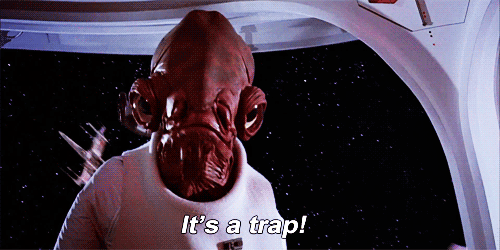It’s that time of the year again – when the New Year begins and the resolutions start strong. For many people this lasts for a few weeks. In fact, at this time they are one with the Force. They are unstoppable. They eat all their vegetables, they avoid all junk food, and they sign up for a 110-year commitment to the gym because this year will be the year that they stick to their resolutions. Forever. And it very well could be.
If so many start strong, then why is it that they are so easily corrupted by the dark side? Why do so many people lose the willpower or the motivation to continue after only a few weeks? Is it because the Force was not strong with them to begin with? Is it because the dark side with its delicious chocolate chip warm baked cookies was just too darn appealing?
No.
The answer is that our expectations for how we should act when we are starting a new regimen are often unrealistic and by setting them too high, we are likely to guarantee ourselves to fail. Have you ever said to yourself, “that’s it, no more sugary drinks. Ever.”? If you did, then have you been able to stick to this? Most likely, not.
In fact, when we create rules that are too rigid, we create an unspoken rule, which states that there are no mistakes allowed, and that if we were to make a mistake, then we are a failure. Then, if a rule is broken (by drinking a sugary beverage, or eating the Sith-baked cookies, or skipping the daily intergalactic gym training), we might then believe that we are in fact a failure. This can lead to a “F**K IT ALL” attitude, a known trap set up by the dark side to temp us to quit.

Basically, we might say, “what the heck, I already had a piece of this pizza, so forget it, my diet is ruined, I might as well eat the rest of the pie.”
Arguably, what happened to Anakin in the prequels can be attributed to the very rigid rules created by the Jedi Council. Anakin was not allowed to have attachments, emotions, love, or friendships, he was held to the highest standard and criticized harshly if he did not meet them. It is therefore not surprising that he ended up turning to the dark side.
What this suggests is that if we set too rigid of rules, we are more likely to break our habits in the face of a setback. On the other hand, if our rules are not as rigid, meaning if we set the intention of trying to go to the gym 3x/week, instead of daily and perhaps plan to exercise for 10 minutes rather than expecting to work out for 1-2 hours every day, then we are more likely to meet and even exceed our expectations, and be more motivated to continue.
In addition, we need to remember that setbacks are inevitable. When (not if, but when) we have a setback, whether it means skipping the gym or eating a donut, we can practice self-forgiveness and remind ourselves to get back on track as soon as we can. In fact, scientists find that it is being more forgiving of ourselves and more flexible with our rules that allows us to rebound after having broken our diet.
One recommendation I have is that if you are going to break your resolution, do so mindfully and compassionately. For example, if you are going to have a piece of cake, take a few breaths to lower the potential anticipation or anxiety you might have and then eat slowly to really enjoy every bite. Make an intention of eating one piece, or even two, enjoy them, mindfully. And set the intention to try to eat healthy to the best of your ability. People who do this instead of shaming themselves for breaking their diet are more likely to only eat a little bit of the diet-breaking food rather than to overindulge in it.
Perhaps this year will be the one. The one where you are able to stick to your resolutions and follow them mindfully. And know that you will break them. But you can always recover and keep going.
May the Force be with you.
Dr. Janina Scarlet is a Licensed Clinical Psychologist, a scientist, and a full time geek. She uses Superhero Therapy to help patients with anxiety, depression, chronic pain, and PTSD at the Center for Stress and Anxiety Management and Sharp Memorial Hospital. Dr. Scarlet also teaches at Alliant International University, San Diego. Her book, Superhero Therapy, is expected to be released in 2016 with Little, Brown Book Group.
If you would like to learn more about Superhero Therapy, please feel free to contact Dr. Janina Scarlet via Twitter @shadowquill, Facebook: https://www.facebook.com/Shadow.Scarletl, or via her website at www.superhero-therapy.com
